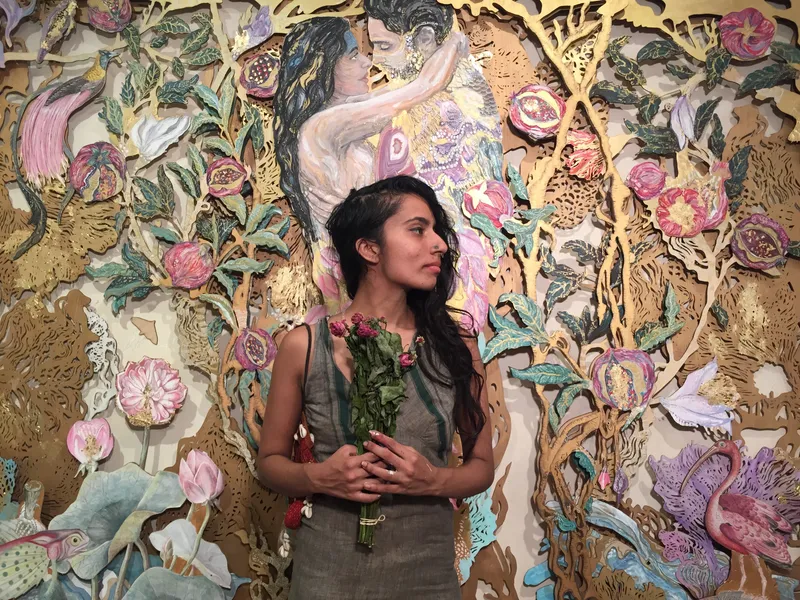Art for social change: how artist Shilo Shiv Suleman is creating safer spaces for the oppressed
Renowned artist Shilo Shiv Suleman from Bengaluru has been using art to bring out issues of many oppressed communities in the world through the Fearless Collective.
As the world turns unsafe by the day, many artists and creative thinkers are working to create safer spaces for everybody. Committed to making public spaces more inclusive and joyful, Shilo Shiv Suleman has been breaking barriers through her art by using public spaces as her canvas.
A revolutionary figure in the broader artist community in India, Shilo uses technology and Augmented Reality (AR) for her artwork and has created large-scale installations across the world.

Shilo Shiv Suleman
The Bengaluru-based artist got inspiration from her mother Nilofer Suleman, a noted contemporary painter, who was left to raise two children by herself. That’s when both of them took to art to sustainably manage the family.
“We began to paint at a time of fear and trauma in our lives when my mother found herself becoming the financial backbone of our family,” Shilo tells SocialStory.
Over the years, art became inseparable for Shilo and found an important place in her life. At 16, she published her first illustrated children’s book, and completed about 10 books by the age of 18.
She now articulates her work across several platforms, including exhibitions, festivals, and conferences. Over the years, she was also chosen as one of the three pioneering Indian women at TED Global, and has spoken at conferences like WIRED, DLD in London and Munich.
“What started as a response to my dad leaving us when I was 14, has turned into an entire life of beauty,” says Shilo, who believes that art helped her heal.
Shilo has created large-scale installations for The Burning Man Festival in the US, which is focused on community, art, self-expression, etc., along with apps that respond to human brainwaves, which have been featured on TED.

One of the wearable sculptures by Shilo
The Fearless Collective
While Shilo was all set to begin her journey as an artist in 2012, the ‘Nirbhaya’ gang-rape case was all over the news. The horrific incident scarred many people, including Shilo, and threatened the safety of the millions of women in the country. Pulling up her socks to fight this, Shilo rerouted her directions.
“When I was working with so much technology, there was a huge crisis with the most basic technology we know, which is our body in public spaces. That’s when I started the Fearless Collective,” she says.

Shilo Shiv Suleman
Started as an online campaign with a small team including Tehani Ariyaratne and Gayatri Ganju, the campaign saw many women coming out with their stories of fearlessness from across the world.
The Collective engages with different impacted communities, including the Syrian refugees of Beirut, queer activists in South Africa, transgender activists in Pakistan, the women at the forefront of Shaheen Bagh, and queer men in Rajasthan, among others.
“We conduct workshops for them and help them use art as a way to represent who they are and how they wanted to be perceived in this world,” Shilo says, adding, “Through these workshops, we essentially make self-portraits in the street and create such monuments for that community.”
Honouring the unsung heroes
During the pandemic, Shilo, through the Fearless Collective, threw light on the lives of waste pickers and Bruhat Bengaluru Mahanagara Palike’s (BBMP) pourakarmikas (civic workers).
Thousands of women step out of their homes to collect, segregate, and recycle the waste that our households dispose on a daily basis.
“Even though they weren’t considered essential services during the lockdown, they are definitely essential to the social and environmental ecosystem,” says Shilo.

The painting in Bengaluru behind Utility Building
Once the lockdown was lifted, the Fearless Collective and Hasiru Dala, an NGO that works with and supports formal and informal waste workers in Bengaluru, started ‘Essential’.
Together, they are looking at how to treat land, life, and labour in the context of a pandemic where ‘essential’ workers are often treated as ‘disposable’ lives, and disposable plastics permeate nearly every part of our landscapes.
Recognising the efforts of these women, Fearless painted a mural on the iconic Utility Building on MG Road in Bengaluru as a testament to the wisdom and dignity and of a community of women who hold the city together.
“The permissions took a really long time, but once we got the permission and worked with the government bodies, it was a really good experience,” says Shilo.
The road ahead
If the pandemic has really taught us something, Shilo says that it is definitely to not plan anything in advance, because uncertainty is on a high.
“While we may not be focussing on what to do for the next three years, we do focus on where the moments of fear are, and how can we turn up and create beauty through art,” she says.
However, she is also focussing on how to expand the Fearless Collective and connect to hundreds of other women, and ensure that the new normal is a kinder and safer world for everybody, regardless of their social and economic background.
Edited by Megha Reddy








